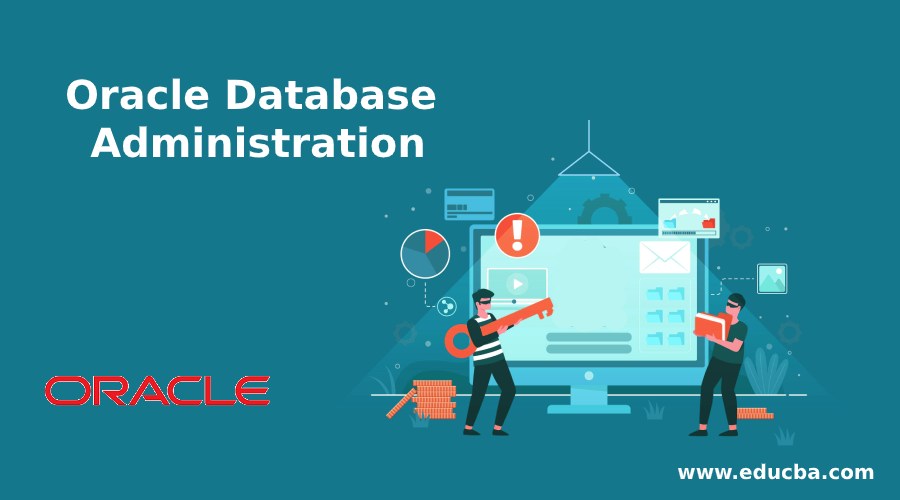Updated February 27, 2023
What is Oracle Database Administration?
Oracle Database Administration is nothing but a predefined role name as DBA. DBA contains all database system level privileges. So, it’s a very powerful role. A DBA performs system level task including installation, configuration, monitoring, tuning, security, etc.
Oracle Database Administration is a role which includes various privileges and responsibility. To get this role, need skills and knowledge. Listed below.
- Very good knowledge about Relational Database Management System
- Knowledge about SQL language
- How to design database
- Database file distribution knowledge
- How to improve performance and tuning
- Understanding about storage techniques
- Knowledge of Database architecture and design
- Understanding of client server model
- Understanding of how to handle and organize large volume of data
Why do we Need Oracle Database Administration?
As the DBA role consists system level privilege, DBA keeps Database environment up and running. DBA keeps an eye on Database uses, security etc. DBA grants an access to users. DBA role includes system level issue troubleshooting, Database Design, migration, Performance, Security, Installation, Configuration, Capacity Planning, Back up, Recovery, hardware issue etc.Oracle Database Administration is very important role to perform tasks / jobs on Database system level.
How does Oracle Database Administration Work?
An Oracle Database Administration work revolves around system level. A DBA supports for production environment and provide Database services to application developer team. A DBA make the DB up and running and always enhance the productivity. There are many services, SQL queries etc run on Database and because of that load on Database server increase in that scenario DBA track that and enhance it. A DBA plays a very important role to keep the Database more productive, creative solutions to customer problem.
Roles of Oracle Database Administration
Oracle Database Administrator are specialized in Oracle Database management.An Oracle Database Administration roles oriented at system level including tasks of Database installation, Maintenance, Data handling specialized, Database recovery & back up. A DBA makes storage plan according to volume of data. A DBA monitor and optimize performance also enhance the slow execution or long running queries. A DBA is well expert and always try to find alternate way to reduce the load on production Database. DBA designs a Database in a way that can handle large volume of data.
Some of the important roles are listed below:
- DBA handles Database installation, patching, maintenance and monitoring
- DBA creates and maintains SQL and PL / SQL queries and shell scripts
- DBA handles memory utilization and management
- DBA enhance and tune Database system
- DBA performs routine security measure
- DBA performs database migration
- DBA changes database instance
- DBA monitor database system
Advantages of Oracle Database Administration
There are many advantages of Oracle Database Administration.
- A DBA is a well expert about Database system
- Well versed to handle huge amounts of data gets generated by the application in such a way that doesn’t affect productivity.
- DBA always enhances Database performance.
- A DBA makes a data management system for reducing data redundancy.
- DBA role provides system security, user access monitoring, maintaining archived data, modifying database structure as per requirement, etc.
- DBA is well specialized and skilled for data extraction, transformation, and loading
- DBA designs a database to store data in such a way that data would more easily readable and understandable for the users.
- As in 21 century data is the most important and critical thing for everyone, and Database management system software stores data and DBA provides security and authentication from unknown users.
- Every day millions of records getting generated and that needs to be stored without any loss of data, so it’s DBA role to plan database capacity accordingly.
- DBA tune database objects for the fast and quick response.
- Day to day volume of data increasing and that needs to be stored, DBA evaluates database server storage.
- DBA handles Oracle database server hardware issues.
Conclusion
Oracle Database Administration is nothing but a role which includes various and powerful privileges. That privilege gives an ability to handle database system and keep the productivity as expected. Oracle Database Administrator is well specialized and skilled to maintain a Database environment stable and running to maintain business continuity. DBA is well skilled to handle data on a large scale.
Recommended Articles
This is a guide to Oracle Database Administration. Here we also discuss the Introduction and need of oracle database administration along with roles and advantages. You may also have a look at the following articles to learn more –



